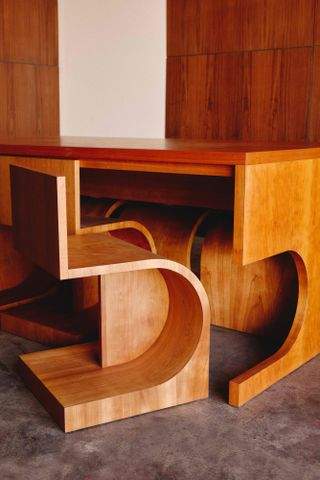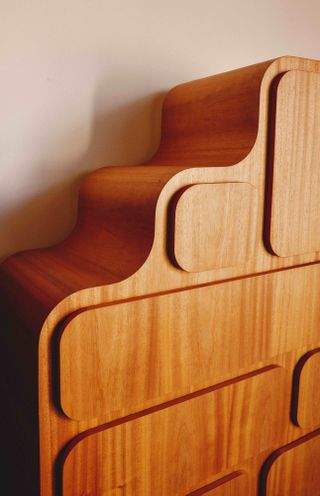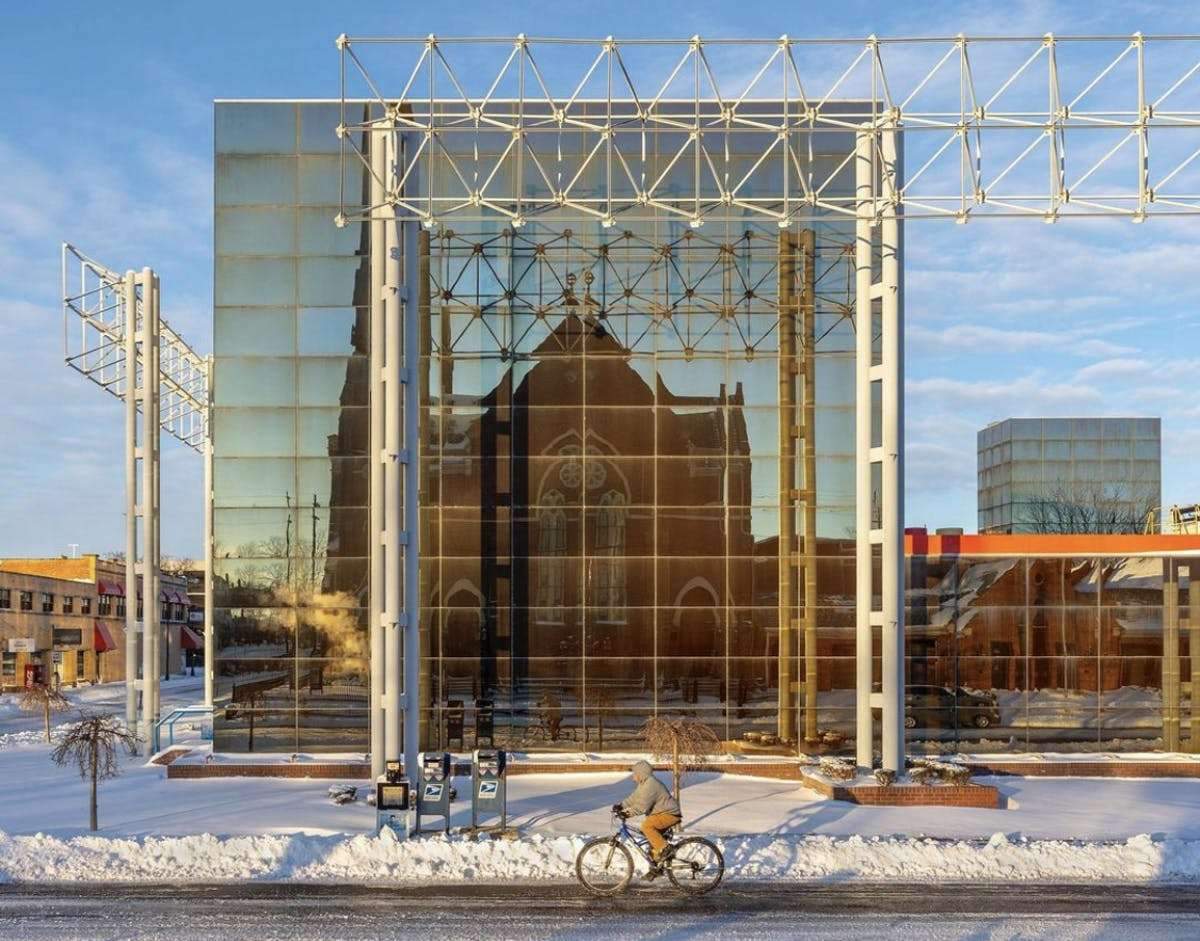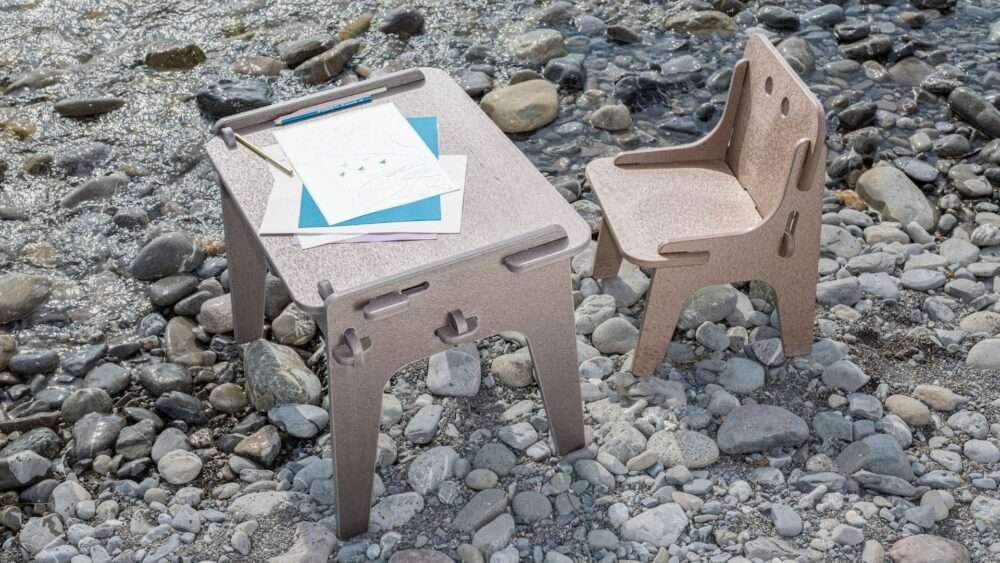Smooth operator: Willett debuts new furniture at Design Miami 2024, with a playful touch of retro allure
There is something nostalgic about the work of Los Angeles-based designer Willett. His spaces, furniture, and objects – all golden-toned wood, silky-smooth lacquer, and soft angles – pay homage to the clean lines and functional ethos of early 20th-century modernism but also lean into the playful allure of the 1960s and 1970s.
His eponymous furniture brand, Willett, officially launched in September 2024 with a six-piece, locally made collection that includes a glossy black lacquered chair called ‘Popo’ (short for popolare), a series of 1960s-inspired credenzas with asymmetrical doors, a low-slung armchair with leather cushions, dining tables with seamlessly integrated seats, a sumptuous daybed, and a black lacquer coffee table wrapped by a recessed band of veneer inlay.
The pieces, although freshly launched, have been incubating for some time. It was during the pandemic, after Willett and his wife, chef Molly Baz, moved from New York to LA, that Willett began experimenting with furniture design. At the time, he was working as an in-house creative director for brands such as Nike and YZY GAP, where he created experiential spaces, making the leap into bespoke furniture design for his own home a relatively straightforward one.
Today, Willett is based out of his newly opened showroom in LA’s Arts District, where he is currently focused on finessing new furniture designs to be launched next year and undertaking several interior design and ground-up build projects. Before the year is out, he is set to showcase pieces from his collection during design Miami 2024 in installations with Swiss furniture brand USM and online marketplace Basic.Space.
We caught up with him ahead of the fair to find out more about his work and what the future holds.
design-miami-2024-showcase-3″>Willett on his debut collection and design Miami 2024 showcase
(Image credit: Photography: Ward & Kweskin)
Wallpaper*: How did your experience designing for Nike and leading design at YZY GAP influence your approach to interiors and furniture?
Willett: Designing for brands like Nike and YZY GAP taught me how to design holistically. I learnt that every experience, whether from 30 feet away or 1 foot away, leaves an impression and draws a through-line. I carry that sentiment into everything I design, whether it’s a single piece of furniture or a large built-in with complementary materials and surfaces. I think about the journey someone will go on, from seeing a piece for the first time to sitting on it and enjoying it – for an hour or a lifetime. Brands like these also taught me how to be very precise and efficient when designing – if it doesn’t serve a purpose, it doesn’t need to exist.
W*: Your designs are made using materials like veneered bent plywood and lacquer. What draws you to them, and how do they reflect your vision?
W: I am drawn to these materials because they are readily available building materials. I think good design should be for everyone, and I’m not interested in creating something that is so difficult to obtain it costs £50,000. The pieces should feel very familiar but refreshing in a world of oversaturation and sameness.

(Image credit: Photography: Ward & Kweskin)
W*: What can you tell us about the new pieces you’re debuting at design Miami and your collaborations with USM and Basic.Space?
W: The pieces I will be debuting at design Miami are my first-ever dining chair, the ‘WT G1 Popo’ chair, in two new colourways – Willett Red and Cream – alongside the previously released Ebony. This complementary set of chairs is my take on a modernist classic in three distinct colours that can be dressed up in a sophisticated dining room or placed singly along a wall as a piece of art. The partnerships with USM and Basic.Space happened very organically; we have a shared relationship to design, and I’m excited to have a presence in both spaces at the fair.
W*: What can visitors to your LA showroom expect to see?
W: I have a showroom in the Arts District that I use as a home base for my pieces. I’m constantly bringing new pieces in, photographing them, sharing them with friends, and then taking them home to live with for a while. I like to get to know each piece before I release it to the world. On any given day, there could be as little as one dining table in there or as many as 12 pieces, ranging from daybeds to small stools. I’m excited to officially share the showroom with the world; it is pared back and hopefully lets the furniture shine.

(Image credit: Photography: Ward & Kweskin)
W*: What’s in store for next year?
W: I have a bunch of exciting projects coming up next year, all of which play with the symbiosis between my furniture and the spaces they live in. I have one project that is a ground-up build whose roofline shares similarities to the silhouette of my ‘WT G1 Baby Grand’ coffee table. Each space is tailored to its environment and surroundings but has a similar design language, which in turn becomes a ‘Willett Space’.
W*: How do you balance your focus between creating spaces and designing furniture?W: There really is no difference between creating spaces and furniture for me – I see them as one and the same and approach them both with the same mentality of bringing beauty into people’s lives through the built world.
The Willett showroom is open by appointment only, which can be requested via willettspace.com
🔗 Source: design-interiors/willett-interview-design-miami-2024″ target=”_blank” rel=”nofollow”>Original Source
📅 Published on: 2024-11-27 14:57:00
🖋️ Author: – An expert in architectural innovation and design trends.
For more inspiring articles and insights, explore our Article Archive.
Note: This article was reviewed and edited by the ArchUp editorial team to ensure accuracy and quality.






